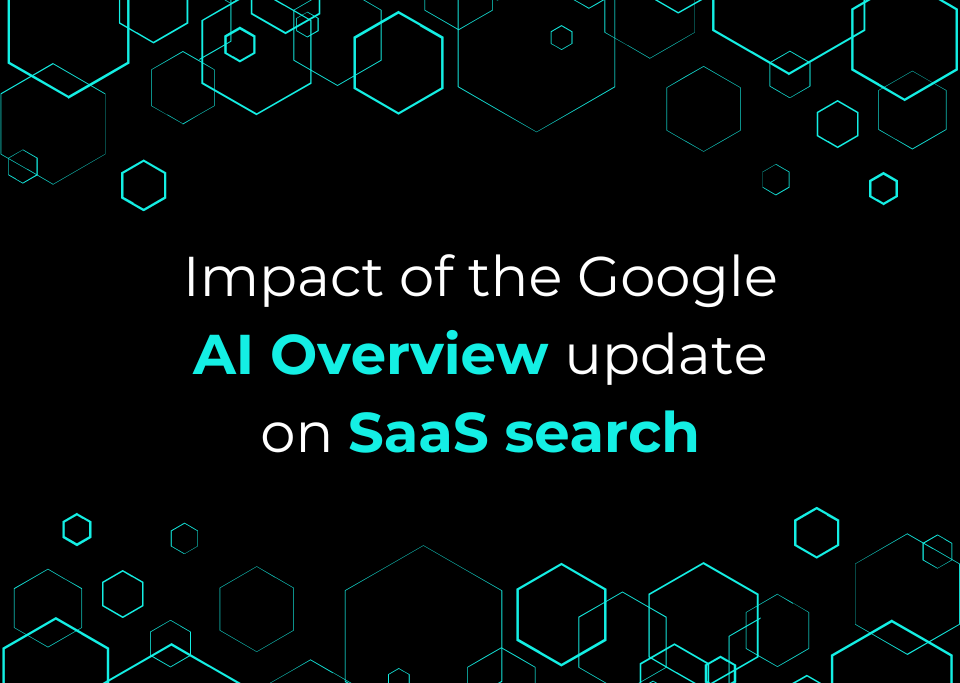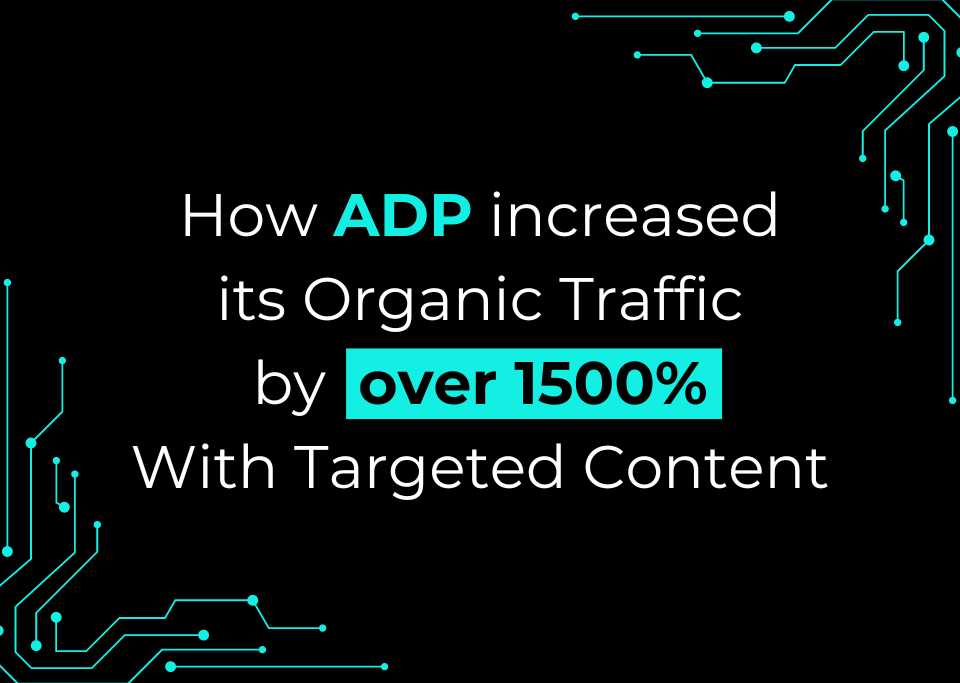5 Ways to Use Social Media For SEO
When it comes to social media you can either love it or hate it, but you certainly can’t ignore it. That’s especially true if you’re in business. Customers and clients expect businesses to have a social media presence. Social media marketing is a vital channel for many firms.
Search Engine Optimisation (SEO) is just as crucial for companies. Any business with an online presence knows how important it is to rank high in the Google search engine results pages (SERPs). Getting a top position for your target keywords can be the difference between your firm thriving and failing.
Book a Consultation
Far too often businesses view social media marketing and organic SEO as two distinct entities. Doing so is a mistake. Social media handled well can provide a real boost to your SEO. You should view the two areas as linked and complementary.
To do this effectively relies on knowing how to best use social media for SEO. That’s what this post aims to teach you. In the next couple of sections we’re going to cover five main ways of using social media for SEO:
- Directing & promoting content
- Influencing generic searches & SERPs
- Building a quality following
- Digital networking
- Leveraging groups for link building
Before we get to grips with those areas, however, let’s first clear up some confusion surrounding social media and SEO.
Social Media’s Relationship to SEO
When people talk about the relationship between social media and SEO most conversations boil down to the two following points:
- Do retweets, mentions and other social media engagements count as a ranking factor with Google?
- Do social media links to pages or pieces of content help the rankings of those pages?
The consensus is that the answer to both of those questions is no. Back when he was head of Google’s webspam team, Matt Cutts said as much in the Google Webmasters video you can see below. A more recent study from Hootsuite validated many of the things that Matt Cutts brought up in the video.
Thinking about things logically, it makes sense. The sheer volume of social media signals would make it an almost impossible task for Google to monitor. This would be further muddied by the impact of PPC campaigns and the relative ease with which you can buy social media signals.
Just to give you a sense of the scale of the market, recent statistics revealed that there are 3.499 billion active social media users worldwide. Those users have on average 7.6 social media accounts each. That equates to a vast amount of social media posts and engagements occurring on a daily basis.
Google have vast resources available to them, but utilizing those resources to crawl and index all of that content seems like an unnecessary use of resources. A similar logical look at the issue of social media links results in the same conclusion. Links to external pages on social media platforms are almost always nofollow links. Even if this weren’t the case, the volume of links generated would reduce the search engine value.
If social media doesn’t directly boost SEO, then, what’s this post all about? It’s about the indirect ways that social media can be used for SEO. Our five ways to use social media for SEO will show you how to use popular social networks to compliment your SEO efforts. So let’s get stuck in.
Directing & Promoting Content
A great content management strategy is key to performing well in SEO. Sites need to have engaging, high quality content that relates to the purpose of the business. That content needs to be refreshed and added to on a regular basis to ensure it’s relevant. The content will also need to meet user intent, which is also important when it comes to ranking in the search results.
There are a couple of major ways that social media can be used to assist with a site’s content management strategy. Social networks can first be a treasure trove for finding topics and ideas for your content. Then, the same or other social platforms will provide a great way to promote and share that content.
When it comes to directing content using social media, Ivan Karmanov, Product Marketing at SEMRush, identifies two platforms which are underutilised. He believes that both Reddit and Quora are great for understanding user intent. They can help site owners ID what users are really interested in. Their content can then be tailored to reflect that.

Reddit has subreddits related to almost every topic you could imagine. You can almost certainly find ones that are relevant to your niche. By browsing those subreddits you can find discussions that inform you what your target audience is interested in. For instance, as a SaaS SEO agency, we might be interested in the following threads:
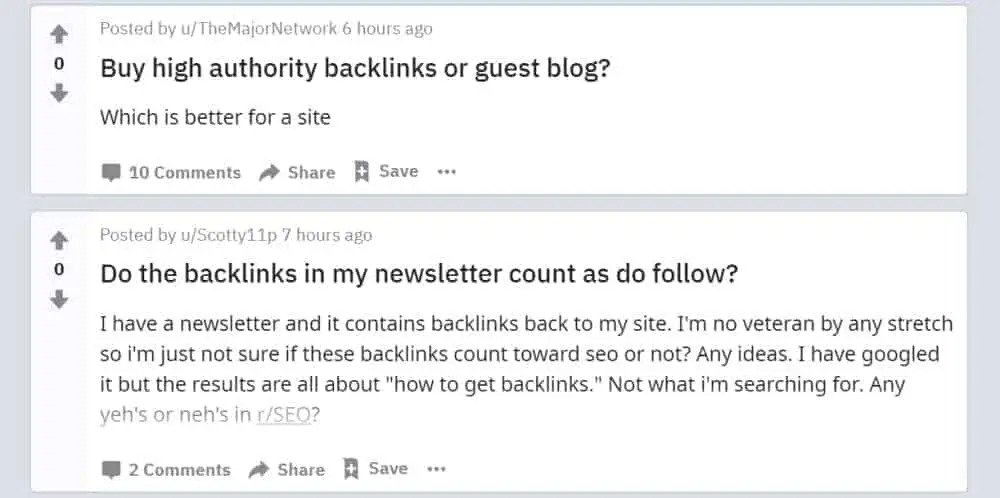
Ivan highlights four main types of Reddit discussion to look out for:
- ‘How Do I X’ type posts
- Lengthy debates
- Most voted questions or questions that were upvoted but ignored in an AMA
- Discussions or comments that receive many upvotes but don’t have a great response yet
These types of discussion are great for content planning. They show what people want to know and likely haven’t yet found satisfying answers for. You can draw that information into your wider keyword research to develop topics and long tail keywords that will really deliver for you.
Quora is another platform that you can use in a similar way. The question and answer service is full of queries from real people. You’ll also find solutions. A quick search of the platform can help you find loads of questions that your content can seek to answer for users.
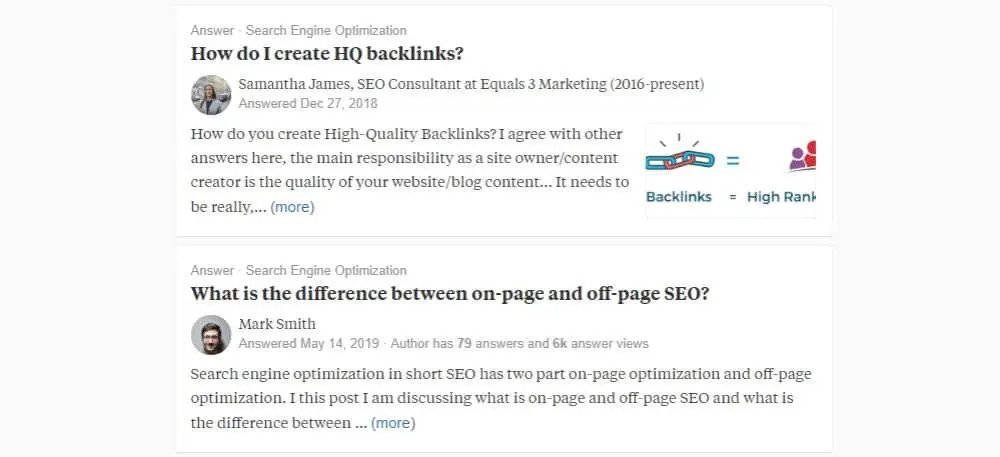
So these are a few of the ways you can use social media to identify great content ideas. It’s surprising how many sites create great content though, but fail to promote it. This goes back to that idea of a dislocation between social media and SEO. Sharing on social media should be one of the first things you think about once you’ve created a new post or article.
Doing so is a great way to get your content noticed by people inside your own network and further afield. If the right people see it, you can then get some tasty links if the content is also well-produced and useful. The following are some simple tips to help you promote your content across social media the right way:
- Design and implement a definite plan for when and where to share content
- Follow that plan for every new piece of content
- Reshare your best content periodically to get it seen by as many people as possible
Influencing Generic Searches & SERPs
The size of a company or site’s social media following is not a direct ranking factor. That doesn’t mean it can’t effect generic searches. In fact, there’s evidence that it does just that. Sites with huge social followings rank better for some keywords. This can be a direct or indirect result of their social media presence.
For example, when a brand becomes well-known people start to use branded terms that include a product to find that company. Levis Jeans is a good example.
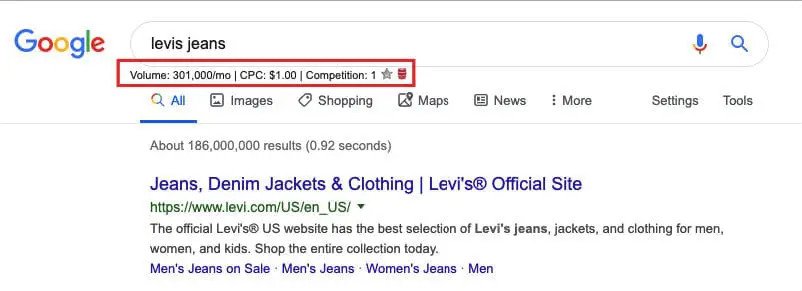
It’s been shown that brand association is a ranking factor for Google. This is logical given that Google is trying to provide the most relevant results for people searching for a product. You can see how in the example below Levis ranks in the number three position in the organic search results for the term jeans.
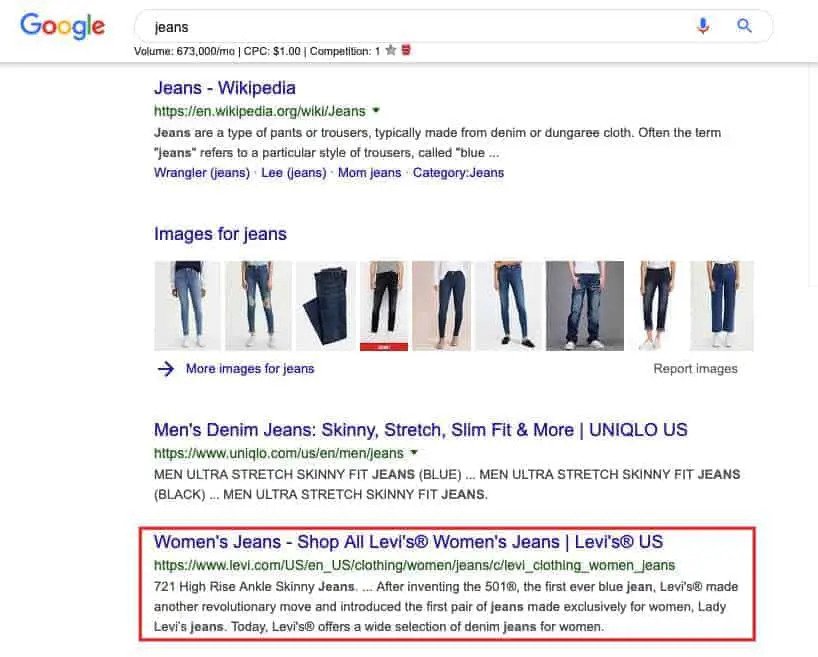
A nice example of this in action is the clothing brand, Fashion Nova. Nothing about the site’s traditional SEO suggested that it ought to be ranking for competitive keywords, but it does. The tens of thousands of branded searches a month provide Google with insights about what the company should be ranking for based on what people are looking for.
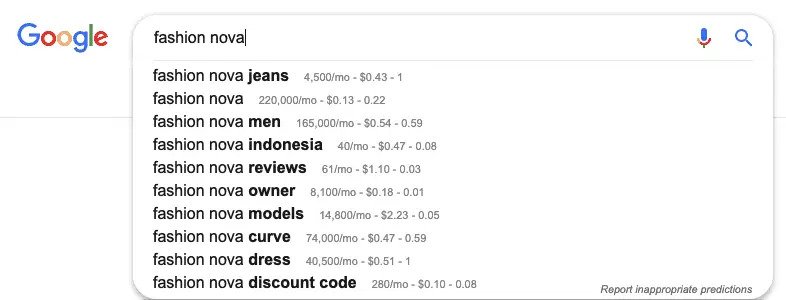
These rankings are the result of the company’s significant social media presence, which created a huge customer base.
Having a well-rounded social media portfolio can also help your company dominate SERPs for branded searches. You can use social profiles with customised URL endings and brand names for headings to rank for your branded searches. This strategy can help you dominate page one of those SERPs helping you drive traffic across different web properties.
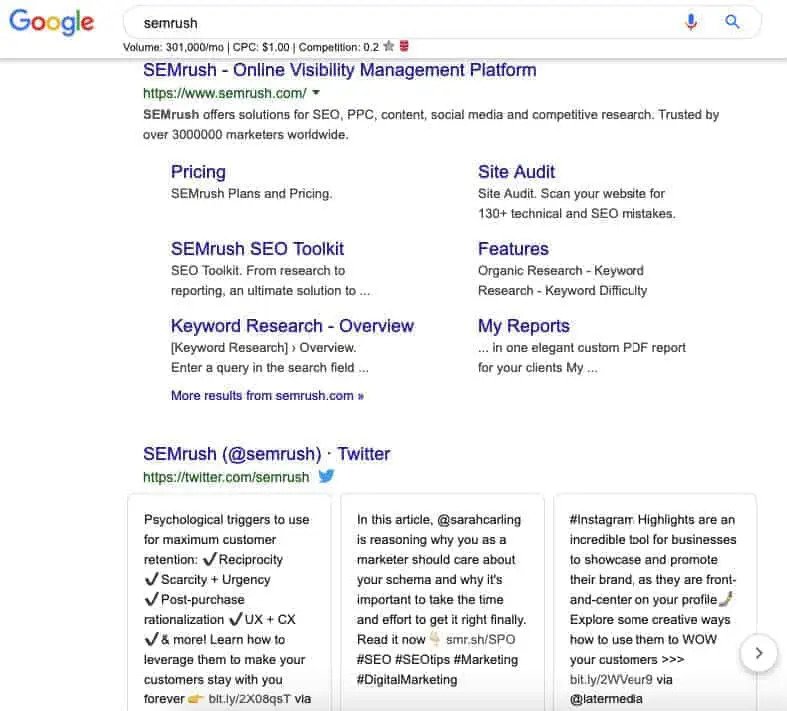
For instance, take a Google search for SEMrush. It returns a first page that includes many of SEMrush’s social profiles. That’s alongside the brand’s main site and other pages.
Building a Quality Following
Building a social media following that can help your SEO isn’t all about quantity. As is often the case, quality is perhaps even more important. Having 100 followers can be better for SEO than having 10,000, if those 100 contain the five top influencers in your niche.
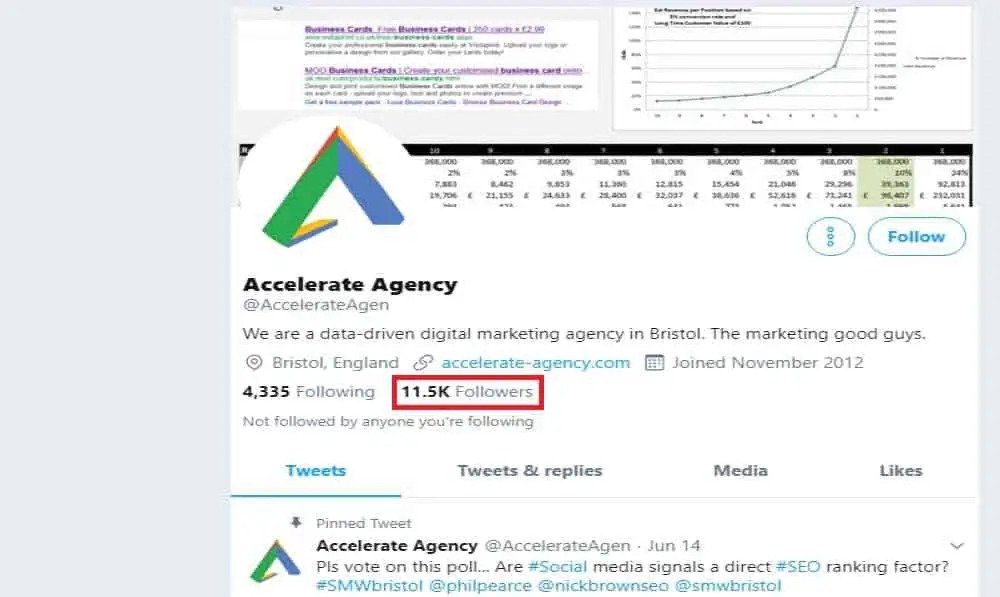
Quality followers are more likely to share your content. They may also reference your content in their own blog posts or articles. If top influencers in your field are following your profile, those references will be worth a lot to your site. A link from a high authority blog, related to your niche is like the holy grail for SEO link building.
To get the attention of these influencers, you first want to do something for them. That might be to share some of their content via social media. It may be linking to one of their articles via your own blog or a guest post you write. Either way, you’re likely to get them interested in you and your content.
Digital Networking
Once you’ve successfully developed a quality social media following, you can further leverage social media for SEO. That’s by building relationships and partnerships. Digital networking can be done in a number of different ways. At its base level, it may mean developing a relationship with fans or followers.
Online networking can also involve reaching out directly to important influencers. They have the Expertise, Authority, and Trustworthiness (EAT) that Google love. Some thoughtful outreach to them can see them share your content, link to your content or result in more direct collaboration.

We favor using LinkedIn for our social media outreach. The platform is designed as a more professional rather than a social network. It also provides a high open rate for messages once you’re connected with people. The example above is a LinkedIn message we sent, which was successful in starting a dialogue with an influencer.
Leveraging the Power of Social Media Groups
Our final way to use social media for SEO is a specific tactic to helps with the two main areas mentioned above. That is to leverage the power of social media groups. It is a strategy that can help you build a quality following and reach out to people within it.
Most social media platforms have a groups feature. LinkedIn has a particularly good one. Groups offer a way for like-minded people or people interested in the same things to interact with. That can be helpful to your SEO efforts. It provides a way for you to find people with an interest in and connection to your niche.
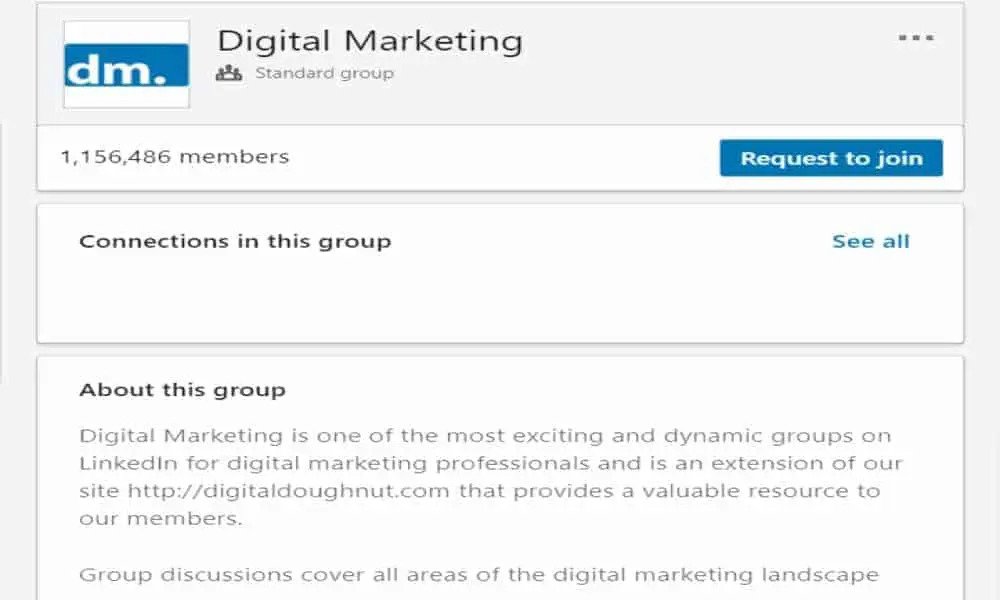
Joining a group related to your niche can make it easier for you to connect with others in your field. A good opener for a message to a potential partner, for instance, might be ‘I see we’re both in the ___ LinkedIn group…’.
The group gives you something in common and makes it easier to make the initial connection. You can use this to get you some valuable links from a high authority influencer. It might lead such an individual to start sharing your social media posts with their network. Either of those scenarios could be hugely beneficial to your SEO. Not to mention your organic traffic.
One thing to avoid in this area is spamming people. You need to research the people you message carefully. You should also take the time to think through how you propose working with them before making contact. Otherwise, you’ll annoy people and damage your credibility within your niche.
